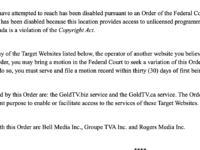The Broadcast and Telecommunications Legislative Review Panel released its much anticipated report yesterday with a vision of a highly regulated Internet in which an expanded CRTC (or a renamed Canadian Communications Commission) would aggressively assert its jurisdictional power over Internet sites and services worldwide with the power to levy massive penalties for failure to comply with its regulatory edicts. The recommendations should be rejected by Innovation, Science and Industry Minister Navdeep Bains and Canadian Heritage Minister Steven Guilbeault as both unnecessary to support a thriving cultural sector and inconsistent with a government committed to innovation and freedom of expression.

Telecom by yum9me (CC BY-NC-ND 2.0) https://flic.kr/p/53jSy4
Telecom
A Demonstrably False Premise: Why “Inevitable” Canadian Internet and Cancon Regulations Won’t Level the Playing Field, Support Canadian Stories or Save a Thriving Industry
Later this week, a government appointed panel tasked with reviewing Canada’s broadcast and telecommunications laws is likely to recommend new regulations for internet streaming companies such as Netflix, Disney, and Amazon that will include mandated contributions to support Canadian film and television production. In fact, even if the panel stops short of that approach, Canadian Heritage Minister Steven Guilbeault and Canadian Radio-television and Telecommunications Commission chair Ian Scott have both signalled their support for new rules with Mr. Guilbeault recently promising legislation by year-end and Mr. Scott calling it inevitable.
My Globe and Mail op-ed notes that the new internet regulations are popular among cultural lobby groups, but their need rests on a shaky policy foundation as many concerns with the fast-evolving sector have proved unfounded.
The LawBytes Podcast, Episode 36: The Year in Canadian Digital Law and Policy
The past year has been an incredibly active one for Canadian digital law and policy with important Supreme Court cases, legislative proposals, committee reports, expert panels, and political promises to reform existing laws and regulation. For this final Lawbytes podcast of 2019, I go solo without a guest to talk about the most significant trends and developments in Canadian digital policy from the past year and think a bit about what may lie ahead next year. I focus on five issues: the “euro-fication” of Canadian digital policy, the debate over the competitiveness of the Canadian wireless market, the many calls for privacy law reform, the future of Canadian copyright reform, and the review of Canadian broadcast and telecom law.
Canadian Copyright Website Blocking Underway As TekSavvy Appeals Federal Court Ruling
Last week I wrote about a federal court ruling that opened the door to copyright website blocking in Canada without Parliament establishing site blocking rules or the involvement of the CRTC. The decision is flawed from both a policy and legal perspective, substituting the views of one judge over Parliament’s judgment and relying on a foreign copyright case that was rendered under markedly different legal rules than those found in Canada. I concluded by noting that the case should be appealed and just over a week later, TekSavvy, the independent ISP that stood alone in contesting the blocking order, did just that. Even as the appeal was launched, however, the major Canadian ISPs began blocking access to the specific webpages identified in the court order.
Federal Court Short-Circuits Voltage Pictures’ Canadian File Sharing Class Action Copyright Lawsuit Strategy
The Federal Court of Canada has strongly rejected an attempt by Voltage Pictures, one of Canada’s most litigious copyright companies, to use a reverse class action lawsuit approach to sue potentially thousands of Canadians. The court ruled that Voltage met none of the requirements for class action certification and in the process confirmed doubts that merely pointing to an IP address is sufficient grounds for a copyright infringement claim. The Voltage strategy was launched in 2016 as it sought certification of the class, a declaration that each member of the class had infringed its copyright, an injunction stopping further infringement, damages, and costs of the legal proceedings (the issues were discussed in this Lawbytes podcast episode with James Plotkin).











